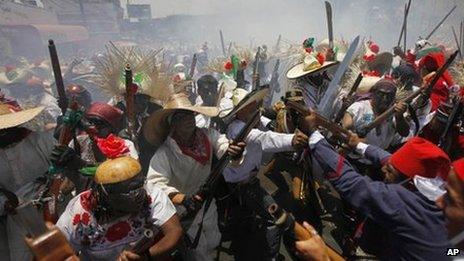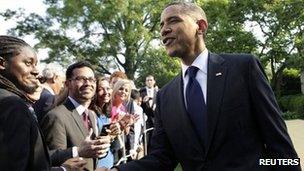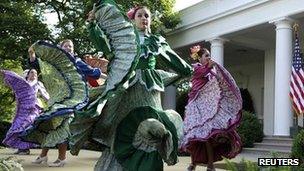The day Americans join Mexico's proud national party
- Published

The Battle of Puebla re-enacted in Mexico City: pride in defeating the powerful French military
If you find yourself on Cermak Road in the Pilsen district of Chicago on Saturday, you might be forgiven for thinking you had stumbled into a Mexican town in the middle of its fiestas.
The green, red and white of the Mexican flag will be everywhere as tens of thousands of Mexican-Americans and other Chicagoans gather to celebrate the Fifth of May or Cinco de Mayo.
That is the day the Mexican army defeated the French invasion against all the odds in the Battle of Puebla in 1862.
In Pilsen, they will mark the occasion with a parade of elaborate floats, mariachis, local beauty queens and talented horsemen. And, being a celebration of Mexico, you'll be able to find good food, music and chelas (beer).
Particularly the beers.
"In Chicago, the Cinco de Mayo is a marketing ploy to sell alcohol," says Vincent Rangel, the President of the Mexican Civic Association of Illinois, and long-time resident of the city.
President Felipe Calderon attended an official ceremony to mark the victory against the invading French army of Napoleon III
"I've been in Chicago for 63 years, and we're dumbfounded at how the date has taken on a life of its own. Especially when you consider that it's really not celebrated in Mexico, unless you're actually from Puebla."
That, says Mr Rangel, is the great irony of the raucous Cinco de Mayo party in the United States: it's a far bigger affair north of the border than it is in Mexico itself.
Latino vote
These days, it has an important political dimension too.
President Barack Obama celebrated the Cinco de Mayo with a group of prominent Hispanic leaders on the Rose Lawn. They were served tuna ceviche and lamb in tamarind mole as President Obama used the occasion to garner support for the Dream Act, a bill to grant legal status to undocumented young people.

Battling for votes: President Obama entertains Hispanic leaders
Meanwhile in Mexico City, the day is likely to pass off like any other Saturday. Few bars will be doing anything out of the ordinary, and there is no sense that this is the "Day of Mexican Pride" as it has been dubbed in the United States.
Apart from in one particular neighbourhood towards Mexico City's international airport, Penon de los Banos. Here, the recreation of the Battle of Puebla has been held for decades and all day the small barrio will reverberate to the sounds of muskets, canons and blood-curdling battle cries.
And, of course, there will be a huge event in Puebla itself.
The picturesque city is where, 150 years ago to the day, the Mexican army under the command of General Ignacio Zaragoza, supported by indigenous warriors carrying machetes, drove out the French troops of Napoleon III.
"Mexico was between two fires," says Juan Pablo Salazar, the official historian of Puebla. "Either we embraced the United States or we embraced Europe."
Indigenous troops
At that fork in the road, he says, the Battle of Puebla was crucial in determining the future direction of Mexico by choosing to defend its fledgling sovereignty from the invading forces.
The nature of the victory was crucial too.
"The French assumed they'd flatten everyone, particularly the indigenous tribes who had no military technology," the historian says. But the Indians, supporting a vastly outnumbered Mexican army, came out to fight from all over Puebla.

The White House gets a preview of the Cinco de Mayo celebrations
"They were very poor, simple people and they fought with their souls. You can imagine the political importance the United States made of the victory. It was a way of telling France: 'This is ours, America is for the Americans'."
The tale of the outnumbered and weaker Mexicans claiming an unlikely victory against one of the most powerful militaries in the world adds to the romance of the Cinco de Mayo, says Juan Pablo Salazar. It is a story which has been celebrated by successive Mexican governments for a century and a half.
On Saturday, thousands of modern-day soldiers will take time away from military matters in Mexico to recreate the battle in front of President Felipe Calderon.
Back in the US, there are still a lot of misconceptions about the Cinco de Mayo, says Mexican-born Chicago resident, Vincent Rangel.
"Most people think it's Mexican Independence Day," he chuckles. (That's actually on 16 September.)
"We home-grown Mexicans laugh a bit at the half-price margaritas and the buckets of Corona beer for five dollars. I know of Irish pubs that have Cinco de Mayo specials, it's bizarre."
But, he adds, for fear of sounding like a killjoy, the older generation aren't trying to rain on the parade.
"I think it's encouraging when people ask us 'What is this Cinco de mayo thing all about?' "
"I explain to my friends who are Germans or Poles or Jewish that, for me at least, it's a moment for quiet reflection about the great sacrifice people made 150 years ago to get us to this point."
- Published24 April 2012
- Published3 April 2012
- Published31 January 2012